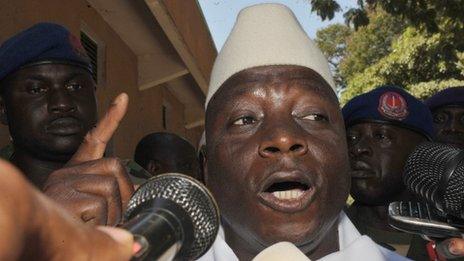Gambia 'coup plot': Inside story of a failed takeover
- Published
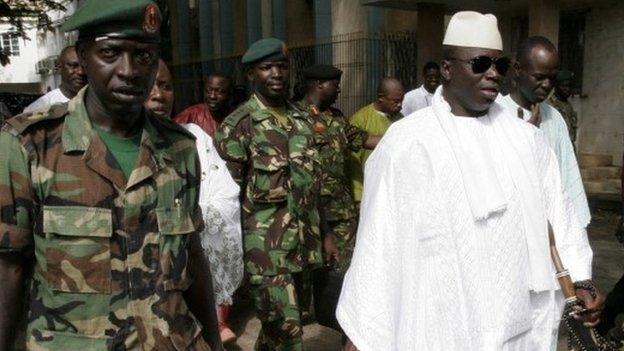
Yahya Jammeh, dressed in white, took power in 1994
An FBI agent has revealed details of the alleged plot to overthrow The Gambia's president during the festive season and it reads like a Hollywood script.
A 22-page affidavit, external submitted to a US court following the arrest of two of the alleged conspirators tells of coup plotters crossing continents, stuffing weapons in barrels and hiding in bushes, using codenames like "Fox" as they tried to keep their identities secret.
But it also suggests that the plotters were naive, thinking the autocratic ruler's guards would flee or switch sides, helping them to gain power without much bloodshed.
Instead, the guards put up a spirited fight, thwarting the coup attempt launched in the early hours of 30 December by men wearing night vision goggles and armed with with semi-automatic rifles allegedly bought in the US.
'Plan stored online'
Agent Nicholas Marshall suggests in the affidavit that the plot was hatched in the US in August, ostensibly to restore democracy in The Gambia - a tiny West African state ruled by Yahya Jammeh since he staged a bloodless coup in 1994.
Allegedly led by 57-year-old Texas businessman Cherno Njie, it had a core of 10-15 members living in the US, UK and Germany - with the US as their headquarters.
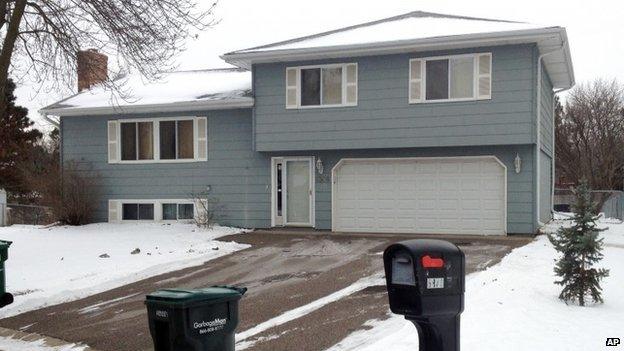
Alleged coup plotter Papa Faal lived in this house in Brooklyn Centre, Minnesota
"They hoped they would be able to take over the country without having to kill any Gambians. They [had] also expected to be joined by up to 160 members of the local Gambian military who supposedly agreed to the coup," Mr Marshall says.
Mr Njie - a US citizen of Gambian origin - was alleged to be the main financier and he would have been installed, according to Mr Marshall, as The Gambia's leader if the coup succeeded.
One of the Texas businessman's co-conspirators was allegedly Papa Faal, 46, a US-Gambian national who assumed the nom de guerre Fox. He handed himself to US authorities after the plot failed - and allegedly spilled the beans to the FBI.


Who is Yahya Jammeh?
Seized power in 1994, aged 29
Accused of stamping out opposition
Claims to be able to cure HIV/Aids
In 2011, told the BBC he would rule for "a billion years"

Both Mr Njie and Mr Faal have been charged in US courts with conspiring to overthrow President Jammeh, but they they have not yet been asked to plead.
"The group's Operation Plan was stored online where only members of the conspiracy could view it," the FBI agent says.
"Faal did not believe anyone outside of the group, including the US government, knew of their plans. Nor did Faal believe that any of their conspirators let their wives or families know about the coup attempt ahead of time."
'Reconnaissance missions'
US nationals of Gambian origin are alleged to have bought weapons from gun shops across America.
"Most, if not all of the members of the group, had served in The Gambian or US military, and were avid shooters," Mr Marshall says.
"Faal enjoyed going to the firing range in the US for practise, but did not go shooting specifically for operational purposes."
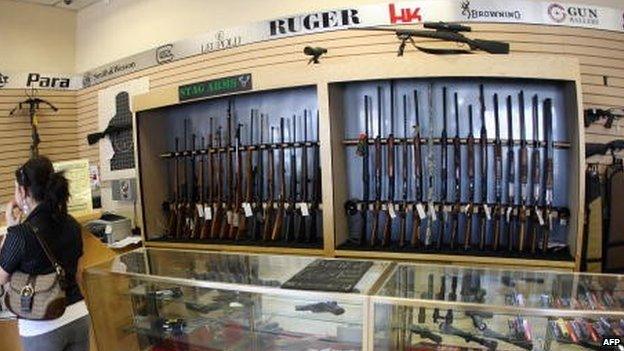
The group allegedly bought weapons from gun shops in the US
Mr Faal spent $6,000 (£3,950) on buying eight M4 semi-automatic rifles in Minnesota, hid them in four "50 gallon barrels" and stuffed clothing around the "disassembled weapons to conceal them", the FBI agent adds.
"The barrels were 'containerized' and shipped under an alias fabricated by Faal."
Night vision goggles, black military-styled uniforms and other equipment were also bought, with each of the alleged plotters given $4,000 for expenses in The Gambia.
"Faal left the US on 3 December via South African Air[ways] and arrived in Senegal. Faal then immediately travelled to The Gambia overland where he stayed until the coup attempt. Once the rest of the group arrived in The Gambia, the group spoke by phone and rarely met with each other," according to Mr Marshall.
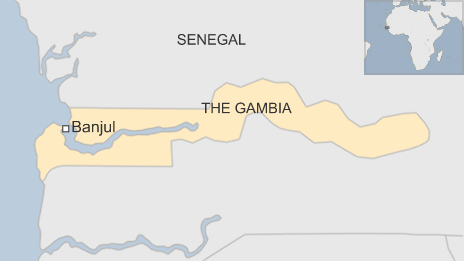
The group then carried out reconnaissance missions and "mental dry runs" with the aim of targeting Mr Jammeh while he travelled by road around Christmas and New Year, the FBI agent adds.
"Their plan entailed blocking the president's convoy and ambushing his vehicle. They planned to fire shots into the air to cause his bodyguards to flee.
"They hoped the president would surrender but were willing to shoot him if he fired at them."
'Palace fortified'
After learning that Mr Jammeh was abroad, the group was forced change their plan, deciding to attack the presidential palace.
They met in woods near the palace and split into two units - Bravo and Alpha.
"There, they changed into their assault gear and put their other belongings into the rented cars they were going to use in the assault," Mr Marshall says.
The plan was for the Alpha team to breach the front door of the palace with a vehicle, while Bravo would secure the back of the building.
"The group believed The Gambian army soldiers at the State House would drop their weapons and flee, being unwilling to die for President Jammeh.
"The group expected that while the two teams took control of the State House, a battalion of Gambian soldiers sympathetic to the conspirators would arrive and offer support."
Instead, the Alpha team found the palace had been fortified with additional guards, who fought back until the coup plot was thwarted.
"Faal believes all of the Alpha team members were killed," the FBI agent says.
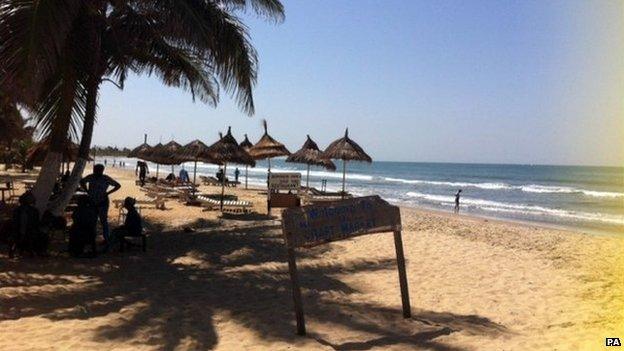
The Gambia is known in the West as a popular tourist destination
Refusing to concede defeat, a member of the Bravo team then attempted to drive a car into the presidential palace, but was killed, according to information the FBI gleaned from Mr Faal.
"Faal fled and took refuge in a nearby building, removed his body armour, boots, and military-style clothing and changed into clothes obtained from a man in the building," Mr Marshall says.
The next day, Mr Faal took a ferry to Senegal, but was refused entry because he did not have a Gambian exit stamp on his passport.
"He was then forced to return to The Gambia on the ferry and obtain an exit permit - which Faal did accomplish. Faal then boarded the ferry again and accomplished his escape to Senegal," the FBI agent says.
Mr Faal then went to the US embassy, where he was questioned on the alleged coup plot, leading to his arrest and that of Mr Njie, the alleged mastermind who had flown back to the US on 3 January via Senegal, according to Mr Marshall.
Their arrest, some analysts say, puts the US in an awkward situation.
It is a staunch critic of Mr Jammeh, accusing him of human rights violations, but it now appears to be helping to tighten his grip on power.
- Published22 January 2017
